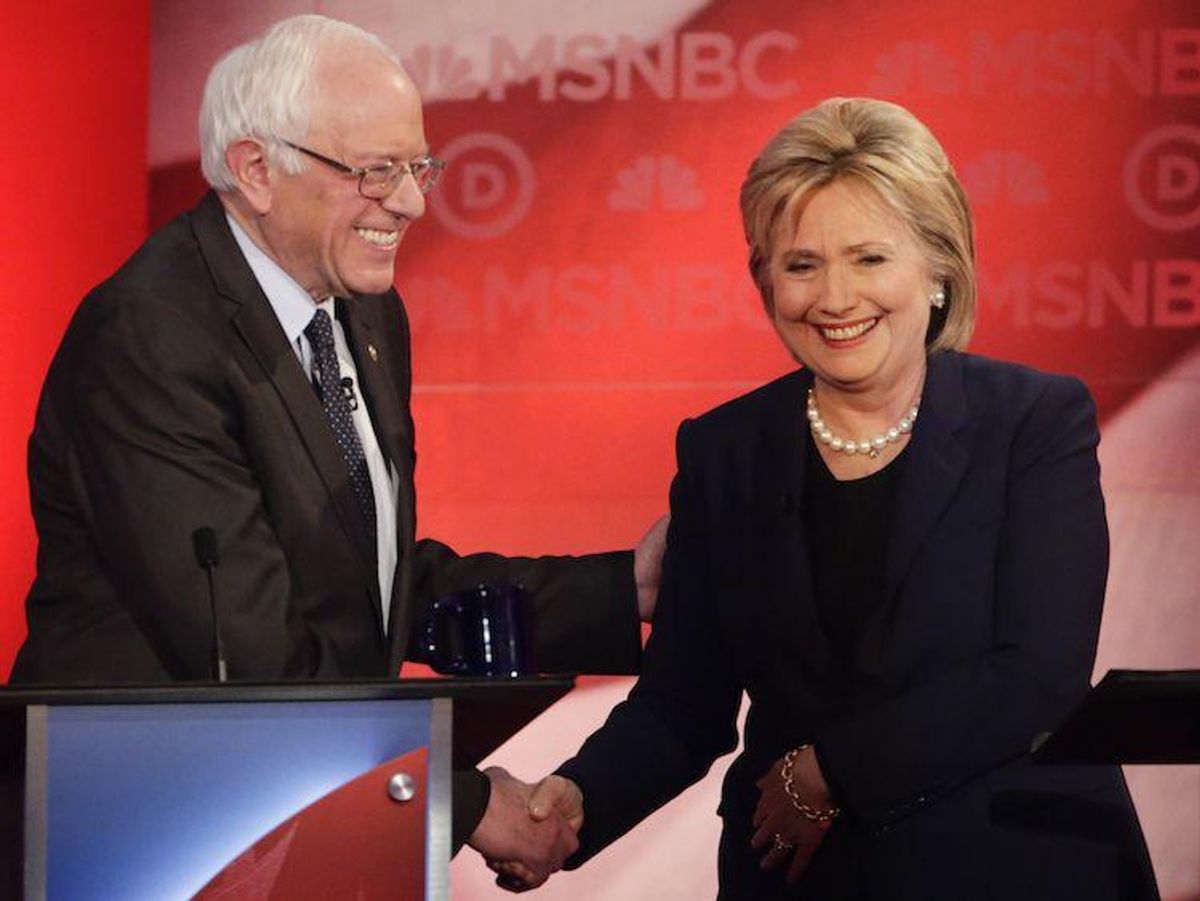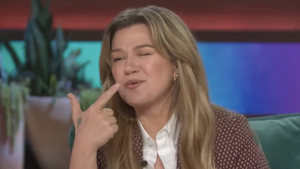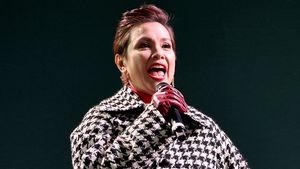Those who were hoping for a lively debate between Hillary Clinton and Bernie Sanders five days before the New Hampshire presidential primary were undoubtedly not disappointed tonight.
The exchanges were especially heated toward the beginning, with the two Democratic contenders sparring over what it means to be a progressive, after Sanders recently questioned Clinton's progressive credentials.
Rachel Maddow, who moderated the MSNBC debate with Chuck Todd at the University of New Hampshire, asked Clinton why Democratic voters should support her, given that Sanders is "basically arguing that you are not progressive enough to be the Democratic nominee. He has said that if you voted for the Iraq war, if you are in favor of the death penalty, if you wobbled on things like the Keystone Pipeline or [Trans-Pacific Partnership], if you said single payer health care could never happen, then you're too far to the right of the Democratic Party to be the party's standard-bearer."
Clinton responded that Democrats should choose her "because I am a progressive who gets things done." She added that Sanders's comments "really caused me to wonder who's left in the progressive wing of the Democratic Party. Under his definition, President Obama is not progressive because he took donations from Wall Street; Vice President Biden is not progressive because she supported Keystone; Sen. [Jeanne] Shaheen is not progressive because she supports the trade pact. Even the late, great Sen. Paul Wellstone would not fit this definition because he voted for DOMA," the antigay Defense of Marriage Act. She contended that Vermont Sen. Sanders's record on gun control is not particularly progressive.
Sanders, for his part, touted his support of single-payer, universal health insurance, while Clinton favors building on the Affordable Care Act to work toward this goal, and for tuition-free public college education, while Clinton would seek to make college more affordable but not free.
"Every major country on earth, whether it's the U.K., whether it's France, whether it's Canada, has managed to provide health care to all people as a right and they are spending significantly less per capita on health care than we are," Sanders said. "So I do not accept the belief that the United States of America can't do that." He also said that it's erroneous to believe he would dismantle the ACA while he tried to get a single-payer plan through Congress.
Sanders, as he has many times previously, talked about the need to ease income inequality in the U.S., and Clinton said she wished to do so as well, but pointed out other types of inequality -- "the continuing challenges of racism, of sexism, of discrimination against the LGBT community," which she repeated at the end of the debate. (Granted, Sanders has also spoken many times against these types of discrimination.)
The upshot of many of their exchanges is that they have similar goals but differ on how to reach them, with Sanders calling for a grassroots political revolution and Clinton positioning herself as someone who knows the ways of practical politics and would be able to put progressive policies into effect.
Sanders returned to familiar themes about the need to get the influence of Wall Street companies and other corporate donors out of politics. "I am very proud to be the only candidate up here who does not have a super PAC, who's not raising huge sums of money from Wall Street and special interests," he said.
At one point Clinton called Sanders out for his "innuendo" that "anybody who ever took donations or speaking fees from any interest group has to be bought."
"I just absolutely reject that, Senator," she said. "And I really don't think these kinds of attacks by insinuation are worthy of you. And enough is enough. If you've got something to say, say it directly. But you will not find that I ever changed a view or a vote because of any donation that I ever received."
She also said she would be a tough regulator of Wall Street and of other companies that contributed to the 2007 financial meltdown, and said Sanders, in frequently invoking Wall Street, was too narrowly focused on "one street."
"It is not one street," Sanders responded. "Wall Street is an entity of unbelievable economic and political power. That's a fact. And I want to say something, and it may sound harsh, not to you, but to the American people. In a sense, in my view, the business model of Wall Street is fraud."
The candidates also discussed foreign policy, with Clinton touting her experience in this realm as secretary of State, and Sanders replying that judgment counts as well, once again criticizing Clinton for her vote in favor of the Iraq war when she was a U.S. senator from New York. But they had few substantive differences on foreign affairs, both emphasizing the need to build coalitions and saying they wouldn't commit U.S. ground troops to fight the terrorist group ISIS but would be supportive of Middle Eastern countries' efforts. Clinton did object to Sanders's expressed desire to normalize relations with Iran, but Sanders stressed this is not something he would do right away; instead, he would take cautious steps in that direction.
A difference emerged on part of the supposed progressive litmus test, opposition to the death penalty. Both had reservations about how states implement it, but Clinton said she would keep it at the federal level for certain heinous crimes, such as Timothy McVeigh's 1995 attack on the federal building in Oklahoma City, which killed 168 people.
Sanders said he opposes the death penalty because too many innocent people, especially members of minority groups, have been executed, and that "in a world of so much violence and killing, I just don't believe that government itself should be part of the killing."
On other issues: Sanders said he agreed with The Des Moines Register, Iowa's largest paper, that there should be an audit of this week's Iowa caucus results, which produced a narrow win for Clinton. "But let's not blow this out of proportion," he added. "This is not a -- this is not, like, a winner-take-all thing. I think where we now stand -- correct me if I'm wrong -- you have 22 delegates, I have 20 delegates. We need 2,500 delegates to win the nomination."
When each was asked if they'd choose the other as a running mate, Clinton, who got the question first, said that was getting ahead of the game. She did say that if she wins the nomination, Sanders would be the first person she'd call for advice. Sanders replied, "I agree with what the secretary said." They also concurrec that Clinton's use of a private email server when she was secretary of State was a nonissue.
They each closed with an appeal to voters, and there was one thing they definitely agreed on. "On our worst days, I think it is fair to say we are 100 times better than any Republican candidate," Sanders said to applause. Clinton added, "That's true. That's true."
The debate marked Clinton and Sanders's first head-to-head meeting since former Maryland Gov. Martin O'Malley dropped out of the race after the Iowa caucus. Watch the closing statement from each below, and go to NBC News for more coverage.


















































































